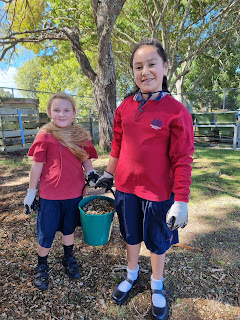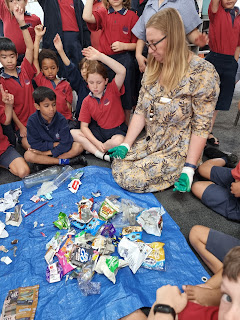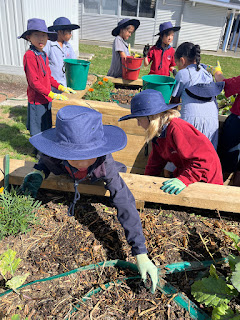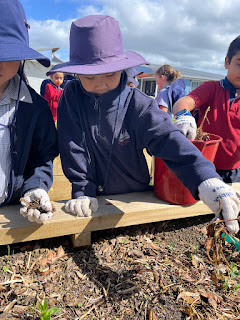By chance, Room 27 was out looking for invertebrates when Alan and Kay from Sweet Azzz came to inspect the beehive and get it ready for winter. Sweet Azz look after our Waka Bees. We stopped what we were doing and watched closely. We got to see the capped pupa, a drone close up and inspect the hive, (from behind the glass of course.) Such a great learning experience for us all.
Tuesday, 26 March 2024
Room 25 & 26 explore Waka for invertebrates
The FBI (Fungus, Bacteria, Invertebrates) are all around us at Waka,
converting our food scraps into nutrient-rich compost.
Rm 25 & 26 investigate.
Sunday, 24 March 2024
Year Three Investigate Invertebrates
Today Year Three investigated the important invertebrates in our compost. They are part of the clean up crew converting our waste into soil.
What are some invertebrates?
Alae "Worms, roly-poly bugs, slugs, and snail"
Max "slaters"
Tom "cockroach and mosquito larvae"
Azariah "worms & snails"
After lunch we moved compost to the native bush walk and went on a bug hunt.
Year Five - Active Travel is good for our bodies
Year 5 investigated how active travel is good for our heart.
First we discovered more about the heart by reading a text in our digital workbook:
Eddy "The heart is a muscle"
Gurdaat "The heart beats 100 000 thousand times a day"
Isher "When you breathe oxygen it is your heart that carries oxygen around your body"
Chloe "Your heart is in the center of your chest"
Amand "Your heart beats on average 3 billion times in a lifetime"
Dilan "Your heart isn't the shape of a heart symbol"
Apollo "My pumps blood"
Next, we recorded our pulse at resting, walking, running and cool down. Lastly we graphed and analysed the results.
After morning tea we got our heart beating by moving mulch to help our native trees grow.
Next time we're looking at how active travel is good for our muscles and mental health.
Monday, 18 March 2024
Year Six Estuary Inquiry
Year Six began an inquiry into estuaries today.
What do we know about estuaries?
Ethan M-C "There are lots of mangroves"
Izzabella "Fish hide in mangroves from the birds"
Harvey "The mangroves act as a nursery for baby fish"
Jaden "A small body of water"
Hannah "Eels can live in estuaries"
Harrison "Sort of like a river"
We found out what an Estuary is and began to think about our local Tamaki Estuary.
What do we want to find out?
What type of estuary is the Tamaki Estuary?
What animals live there?
Can we eat shellfish from there?
Why are there mangroves there now?
Next time we're looking forward to finding out why estuaries are important in the past and in the future.
In the meantime, for homework, we can visit the estuary and enter the estuary photo: competition: https://docs.google.com/presentation/d/1aCjzqhyEgcIjnjbta_eo7o1ToVceqYJGS8E-y6zc2xg/edit?usp=sharing
Sunday, 17 March 2024
♻️🌏Eco Warriors at Eye On Nature🌏♻️
♻️🌏Eco Warriors at Eye On Nature🌏♻️ We were lucky enough to attend Manukau Beautification Trust's annual event at the Botanic Gardens today. Through the various activities, run by experts, we have been inspired to think global and act local to protect te taiao.
Monday, 11 March 2024
Tahora with Year Four
Year 4 continued their SeaWeek studies today with a deep dive into the world of the whales that live in the Hauraki Gulf.
We began by estimating 15 meters outside - that's the length of a Bryde's Whale.
What do you already know about whales?
Archie "They are very big. They holes that they breathe through and shoot out water. Some whales can eat the colossal squid."
What have you learnt about the whales that live in the Hauraki Gulf?
Timothy "Brydes whales like to go into a feeding frenzy to eat fish from the size of plankton to pilchards"
Riley "Bryde's whales are tahora nui"
Louie "When they eat food they drain all the water out"
Hector "They don't really mind what they eat"
Savannah "When they eat they spit the water out and eat the fish"
Alexander and Dihan "The whales like to feed to close to the dolphins and fish and birds"
Amandi "We're looking at Bryde's Whales"
Scarlett "They are 15metres long"
Tom "I didn't know there were Brydes whales in our ocean"
Max "Their teeth are made with the same stuff as our fingernails"
Bianca "Their noses are on top of their heads"
Irina "They are endangered"
Logan "They are endangered from boats"
Esther "The teeth are made out of carotene"
Paige "They put water in their mouth when they eat their food"
Kai "Brydes whales like to hang out in the Hauraki Gulf"
Boreer "I saw sea life and dolphins"
Kavishka "Some water comes out when they breathe"
Maicah "There are 200 Brydes Whales in the Hauraki Gulf"
Paige "Tahora is the Maori name for whale"
Ben "They are long and their tail goes down"
We sketched the Bryde's Whale
The shipping community has slowed down to protect the Bryde's whales. What can we do?
Sammy & Jacob "Bring a litter free lunch"
Kai "Take your litter home"
Bianca "Use more paper than plastic"
Kybah "If you see rubbish pick it up"
Louie "Use reusable plastic"
Hector "Open the plastic at home and put the food in your lunchbox"
Charlie "Have a reusable lunchbox"
Logan "Write a letter to the Council to tell the sailors to slow down to 5 knots"
Erika "If you see plastic in the ocean take it out"
We took action by going on a litter hunt. Sadly we found SO MUCH litter. Most of it was plastic and most of it was food packets from lunchboxes. We estimated that we had collected 80 -100 pieces of litter in just 10 minutes. We then actually counted each piece and discovered we had collected ONE HUNDRED AND EIGHTY-TWO pieces of litter.
PLEASE BRING A LITTER FREE LUNCH.
Sunday, 10 March 2024
Year Three Do the Rot Thing
We were learning about the FBI - fungus, bacteria, and invertebrates and how they play a vital role in creating new soil for growing new food.
Inside our lunch boxes, we thought through how all our kai comes from the soil and it's only humans who have created non-biodegradable things like plastic packets that just junk up the world. We realised how important it is to compost our food scraps. Do you use your food scraps bin at home?
Lastly, we looked at the school worm farms and composts. We combined worm tea and compost to create a supercharged fertiliser for our new mara kai and native bush walk. Carefully we spread the nutrients over the soil. We're turning food we don't want into food we DO want.
Some of us were lucky enough to eat peaches and apples fresh from the school trees and yes of course we composted the scraps. Do you grow food at home?
Next time we have EfS we're looking forward to investigating the invertebrates in our compost.
Room 2 & 3 Explore Ladybirds
Our Year 1 classes had fun looking at how we get rid of pests on our plants like aphids. We learnt that if we plant marigolds, they attract...

-
What an incredible day Year 4 have had learning about tohura (whales). Michael visited from Project Jonah with his amazing life size blow ...
-
Today, Year One are learning about how plants grow. We passed around a mystery object. What is it? Edison "It was a bean" What i...
-
Today Year One split into small groups and passed around a mystery object. What was it? A pebble? A shell? A nut? No it was a bean seed. ...
































































